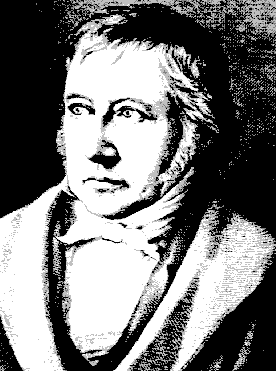
Jamie Long-Bilbrey
Jamie.Long-Bilbrey@asu.edu
Background

Georg Wilhelm Friedrich Hegel (1770-1831) was a "central philosopher of modern nationalism" (Richter 356). In addition to epitomizing German idealist philosophy, Hegel boldly claimed that his own system of philosophy represented an historical culmination of all previous philosophical thought. Hegel's overall encyclopedic system is divided into the science of Logic, the philosophy of Nature, and the philosophy of Spirit. Of most enduring interest are his views on history, society, and the state, which fall within the realm of Objective Spirit. His philosophy and his ideas were keys in developing the transcendental dialectic movement - a movement based on the principle of a 'thesis, antithesis, synthesis' argument. Hegel was obsessed with the connection between history and the evolution of humanity - the spirit of humanity. He developed much of his theory based on the idea of a march of spirit through materialism: the progression of the human spirit was thus, not a progression where one methodology becomes more valid than the one previously - it is rather the progression of humanity through the history of the spirit. Hegel marked art as the embodiment of spirit and therefore the benchmarker of the progression of the human spirit throughout the ages. Hegel's interest in the spirit goes beyond the idea of an essence: he sees spirit as the mirror of society, or what people are and have evolved into. Frankenstein by Mary Shelley (a contemporary of Hegel) can thus be viewed from a Hegelian perspective in two main ways: as a work of art reflecting society, and as a commentary on society within society.
The dialectic is a branch of logic in the art of reasoning and\or disputing. It is a classic approach, one at which Socrates was a master. It was employed, as often it was, beginning with Plato, to set one theory in opposition with another, and thus to develop a subject in a comprehensive manner. To come to Hegel's philosophy one starts with Kant and proceeds through Fichte and Schelling. Hegal departed from the Fichte-Schelling "Ego-nonEgo" analysis by stating that it was reason that should take over, not your reason or not my reason, but the World Reason, Universal Consciousness; an Absolute. The Hegelian view, arrived at by the dialectic method, was that there were fundamental laws which drove the development of a culture or a country; that a culture or a country has a kind of a personality of its own, and its development is to be explained in terms of its own character. Hegel also supported the idea that men are dissatisfied or so alienated in their practical life that they need to believe in illusory ideas such as religion or nationalism. These notions of historical development and of alienation were to play a crucial role in the thoughts of Marx. Marx followed Hegel, who had a deterministic view and that all events (economic stages) come about as a result of the inevitable progress of history. In later years, a fellow German, Adolf Hitler, rose to this Hegelian bait. If one needs an example of a philosophy which can lead millions of people into ruin, then one need look no further than the philosophy of Hegel.
For further information on Hegel visit the following links:
Stanford Encycolpedia of Philosophy
Introduction to Phenomenology of Spirit